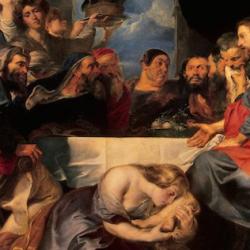Some thoughts inspired by Joel Green’s commentary on Luke 22-23:
Luke stuffs his account of Jesus’ trials with understated ironies. The soldiers mock Jesus’ prophetic claims by blindfolding and beating Him; but this is just what Jesus said was going to happen to Him. Jesus tells the Jewish leaders that they won’t believe He’s the Christ even if he tells them, and when He tells them ?Esurprise! ?Ethey don’t believe Him. They hear Jesus condemn Himself from His own mouth; but they have condemned themselves, because their unbelief confirms that Jesus is the Christ, since it is necessary for the Christ to suffer and enter into His glory.
The ironies continue in the trial before Pilate. The Jews accuse Jesus of stirring up the people, and to make sure their point sticks they stir up the people into a riotous frenzy that pushes Pilate over the edge. They claim that Jesus threatens to cause insurrection, but they accept Barabbas, a convicted revolutionary, back into their community.
Herod’s actions are similarly ironic. He mocks Jesus, as the Jews and Pilate have done, and adds one key element: He “dressed Him in a gorgeous robe and sent Him back to Pilate” (23:11). The “brilliant” robe (sometimes a textual variant is accepted that makes the translation “robes of light”) reminds us of the flashing robes of Jesus at the mount of transfiguration. The transfiguration is a proleptic revelation of the future glory of the Son of Man, and Jesus has just told the Sanhedrin that He will one day come into that glory. Herod confirms Jesus’ prediction, giving Him the robe of exaltation in the midst of His humiliation.















